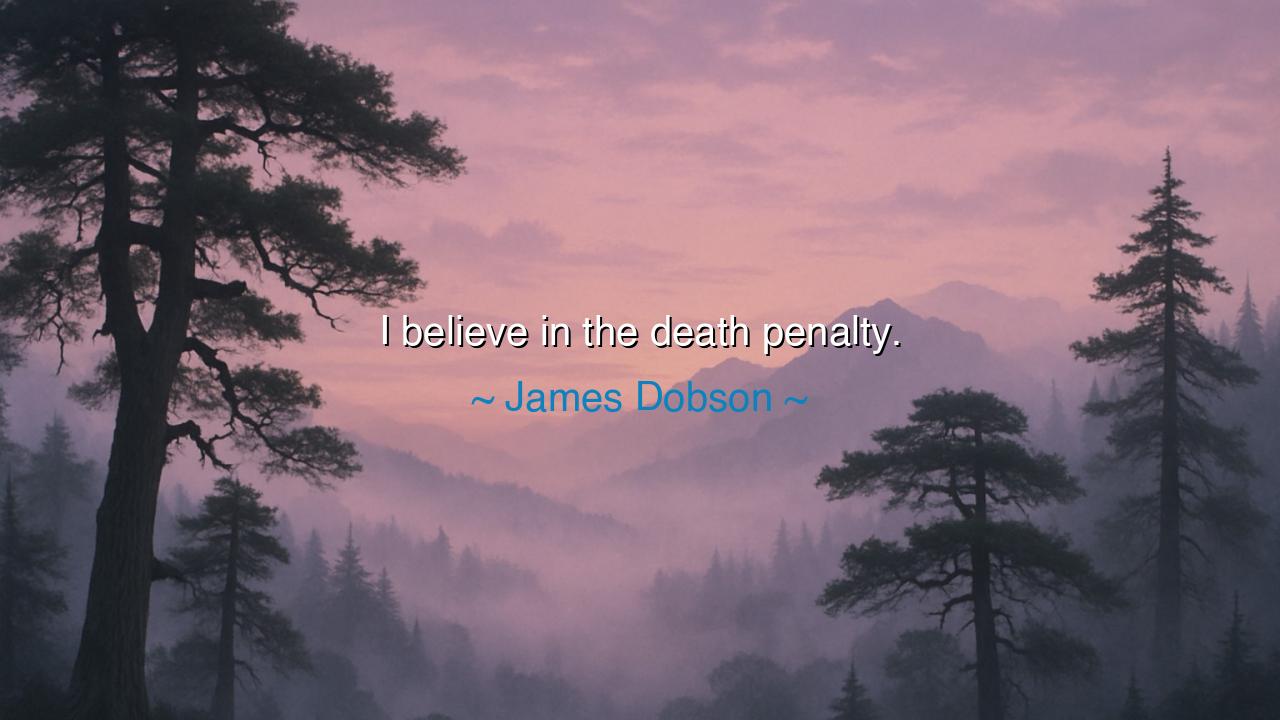
I believe in the death penalty.






“I believe in the death penalty.” So spoke James Dobson, the American evangelical leader whose voice has long echoed through the moral debates of his time. At first glance, his words strike like iron — hard, severe, and unyielding. Yet within them lies not mere judgment, but the weight of a conviction shaped by faith, by law, and by the age-old struggle between justice and mercy. To understand this saying, one must not hear it as a simple endorsement of punishment, but as a reflection of the eternal question: how shall humanity balance righteousness with compassion, and what price must be paid for the preservation of moral order?
The origin of this declaration comes from Dobson’s deep belief in divine justice — a worldview rooted in Scripture, where both life and law are sacred. To him, the death penalty was not vengeance, but the earthly mirror of divine accountability. “Whoever sheds man’s blood,” says the Book of Genesis, “by man shall his blood be shed.” For Dobson and those who think as he did, these words carry the voice of timeless order, a decree that the sanctity of life must be upheld even by the punishment of those who destroy it. In his eyes, mercy without justice breeds chaos, and law without consequence invites decay. Thus, his statement was not a cry for cruelty, but for the maintenance of moral equilibrium in a fallen world.
But to believe in such a principle is to carry a burden, for it is no small thing to sanction death, even in the name of justice. Across the ages, kings, prophets, and judges have wrestled with the same dilemma. The ancient Israelites, who received the law of Moses, applied the penalty of death sparingly, fearing to stain their hands with innocent blood. Even in Rome, whose might enforced order upon the world, there were philosophers who questioned whether man had the right to end what only the gods could grant. Thus, Dobson’s words echo not merely as a personal belief, but as part of an ancient and unending dialogue — a struggle between the hand of justice and the heart of mercy.
History itself offers countless examples of this struggle. Consider Socrates, condemned to death by his own city for corrupting the youth of Athens. The law demanded his execution, and yet, centuries later, that act stands as a wound upon the conscience of civilization. Or think of Abraham Lincoln, who during the Civil War reviewed each military death sentence personally, seeking mercy wherever the law would allow it. He once said, “I have always found that mercy bears richer fruits than strict justice.” And yet even he knew that discipline was the foundation of order. These stories reveal the eternal tension at the heart of Dobson’s declaration: that belief in the death penalty is not belief in death itself, but in the necessity of justice when chaos threatens to devour life.
Dobson’s statement also reveals a deeper truth about the human spirit — that we are creatures both moral and mortal, ever seeking balance between right and redemption. For every society must ask: what is the value of a life that takes life? If we abolish all punishment, do we not endanger the innocent? Yet if we embrace death too easily, do we not endanger our own souls? The true wisdom lies not in shouting for one side or the other, but in holding both in tension — acknowledging that justice and mercy must walk together, as two pillars supporting the same sacred roof.
And yet, many have opposed Dobson’s view, not out of rebellion, but out of reverence for life itself. They have argued, as did Mahatma Gandhi, that “an eye for an eye makes the whole world blind.” They see in the death penalty not divine justice, but human arrogance — the belief that fallible hands may wield the ultimate power of life and death. To them, the lesson of faith is not retribution, but forgiveness — not judgment, but restoration. Thus, even as Dobson declared his belief, others answered that to believe in the sanctity of life is to protect it, even when it has been desecrated.
The lesson, therefore, is not that one must agree or disagree with Dobson’s conviction, but that one must think deeply about what justice truly means. Whether one stands for the penalty or against it, the question remains: what kind of world are we shaping with our choices? The call of conscience is to seek not easy answers, but moral clarity — to recognize that every decision concerning life and death must be weighed with humility, prayer, and trembling. For justice without compassion becomes cruelty, and compassion without justice becomes anarchy.
So, remember this: to believe in the death penalty is to believe in responsibility — that every life and every action carries weight before heaven. But to live wisely within that belief is to temper it with mercy, to wield judgment as the surgeon wields his blade — not to destroy, but to heal the greater body of mankind. In this, as in all things, the true disciple of justice walks the narrow path between law and love, where neither vengeance nor weakness may reign, but only truth.






AAdministratorAdministrator
Welcome, honored guests. Please leave a comment, we will respond soon